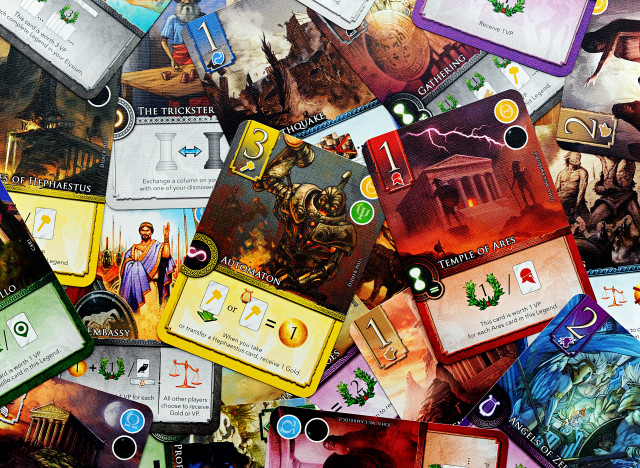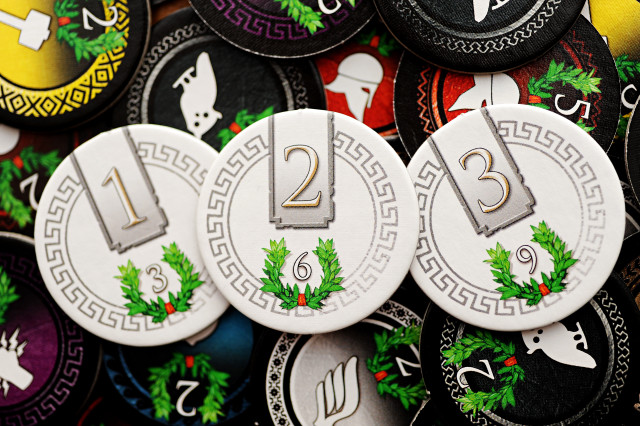In Elysium you recruit the favour, powers and heroes of ancient Greek gods and write their legends. The better the tales you tell, the more points you will get at the end of the game. Elysium is all about finding synergies between cards and deciding when to hold on to them for their action and when to lock them in for points. It’s played over five epochs with simple phases to each. The most intriguing thing to me about it is the economy of the game. Four different coloured pillars make up your economy each round. How to best spend them can be delightfully tricky!
Elysium comes with eight different families (or decks) of Greek gods. Each game will use five of those families to make up the main deck. Choose from Apollo, Zeus, Hades, Ares, Athena, Hephaestus, Hermes and Poseidon. The gods have cards and powers unique to them and so each combination can make for a different feel to the game. Poseidon, for example, has cards that launch attacks at other players, while Hephaestus aids in generating gold.
The epochs begin with the Awakening phase. Cards are drawn from the main deck to fill the Agora (or market) and players reclaim their pillars.
 During the Action phase, players in turn order will acquire cards to their Domain or take a Quest. Here’s where the interesting economy comes in. Everyone will start the epoch with four pillars (red, green, blue and yellow). Rather than having a specific colour cost, cards have a requirement. Some may require you to have your red and blue pillars still in your supply. If you fulfil that requirement you can grab that card. Now the cost for any card or quest is discarding one pillar, but it’s up to you which you’ll use up for the round. It can even be a pillar not required for the acquisition of the card. Being aware of what is still left on the board and what your opponents might be after is critical.
During the Action phase, players in turn order will acquire cards to their Domain or take a Quest. Here’s where the interesting economy comes in. Everyone will start the epoch with four pillars (red, green, blue and yellow). Rather than having a specific colour cost, cards have a requirement. Some may require you to have your red and blue pillars still in your supply. If you fulfil that requirement you can grab that card. Now the cost for any card or quest is discarding one pillar, but it’s up to you which you’ll use up for the round. It can even be a pillar not required for the acquisition of the card. Being aware of what is still left on the board and what your opponents might be after is critical.
Cards are activated at different times. Some have a instant or continuous effect, others are triggered and some are just worth points at the end of the game. Quests also require and cost a pillar. They will go to determining turn order and how well you can write your legends.
At the end of four Action rounds players will have spent all their pillars and acquired three cards and one quest. If players can’t meet the requirements for a card they get a Citizen from the top of the deck, which is just the back face of every card in the game. If players can’t get a quest they skip their turn and then take the lowest quest available with the back side turned up.
Now it’s time to write some legends! The quests all come with turn order numbers. Players rearrange their turn order tokens based on the quest they got and then proceed in the new order. Writing legends allows players to transfer cards from their Domain to their Elysium. Only cards in the Elysium at the end of the game are scored for points. Each quest come with a number of transfers for the player that claimed it. Cards all have a level of one, two or three and it costs that number in gold to transfer them down to your Elysium.
There are two different types of Legends you can write into your Elysium. Family legends contain cards all from one family, but of different levels. Level legends have cards of the same level, but different families. The longest family legend is going to be three cards and the longest level legend is five cards. At game end points will be awarded to legends of at least two cards, with obviously more points going to the longer legends. Citizens can be used as wild cards bought from your Domain to your Elysium. You pay the cost of the card it’s replacing. This can be helpful completing sets, but each citizen in your Elysium costs you two points at then end of the game. Once cards are moved to your Elysium they can no longer be used for their actions, so players have to decide when it is best to cash in.
 Bonus tokens are awarded for the first two sets completed in each different family and bonuses for the different levels go out as soon as someone has at least two cards in their legend. The level bonuses can be stolen if an opponent makes a longer legend. It can only be secured if someone builds a fifth card into that level.
Bonus tokens are awarded for the first two sets completed in each different family and bonuses for the different levels go out as soon as someone has at least two cards in their legend. The level bonuses can be stolen if an opponent makes a longer legend. It can only be secured if someone builds a fifth card into that level.
After five epochs there is a final scoring. Players receive points for the legends that they have written, the bonus tokens they’re acquired and any card with end game scoring points to it. The first play through may be a bit tricky as players learn the iconography and value of different actions, but after five epochs everyone should have a pretty good idea of what’s going on and how to play better next time…which they will probably want to do immediately.
The art in this game is really incredible and Space Cowboys went the extra mile on it. They could’ve just hired one artist for the entire game, but each different god family is done by a different artist. It gives each deck you add to the game a really unique feel. The pillars are wooden and colourful. The iconography is pretty clear and straight forward, but if you ever doubt anything, the rules are written out on the cards too, to help avoid confusion. I’m even going to mention the insert in the game. Everything fits in nicely and is tucked away securely, but when everything is in place it looks like an ancient Greek temple. Very cool!
Elysium is drawing some comparisons to Deus, but beyond finding card synergies and the theme I don’t think there’s too much in common. It reminds me more of 7 Wonders. The rounds feel like an open draft and choosing when to grab scoring cards and when to build your potential action base is very 7 Wonders. That being said, Elysium is unique enough that you could have all three in your collection. I really enjoy the tension of spending your pillars and finding the right combinations of legends to maximize your points. This is a home run as far as I’m concerned. Give it a shot and start writing some legends of your own!
Great description of Elysium! Makes me want to sit down and play it. Also like the comparison to other games like Deus and 7 Wonders – helps to understand how it is played. As always great pics of game cards and pieces.